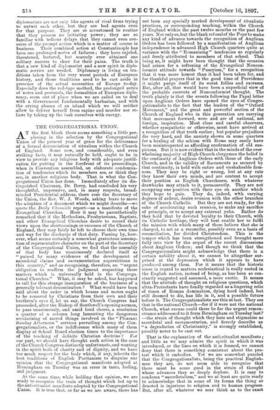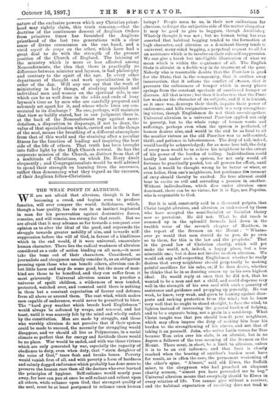THE CONGREGATIONAL UNION.
AT the first blush there seems something a little per- plexing in the selection by the Congregational Union of the present year of grace for the deliverance -of a formal denunciation of ritualism within the Church of England. Some new, and considerable, and even striking facts, it may naturally be held, ought to be in view to provide any religious body with adequate justifi- cation for putting in the forefront of its proceedings, when in Convention assembled, an elaborate condemna- tion of tendencies which its members see, or think they see, in another religious body. That is what the Con- gregational Union has done. Immediately after its dis- tinguished Chairman, Dr. Berry, had concluded his very thoughtful, impressive, and, in many respects, broad- minded Presidential address, there rose the Secretary of the Union, the Rev. W. J. Woods, asking leave to move the adoption of a document which we might describe—we quote the Daily Chronicle report—as a manifesto of the Evangelical Churches. Here it may be parenthetically remarked that if the Methodists, Presbyterians, Baptists, and other Evangelical Churches desire to record their views upon the shortcomings or excesses of the Church of England, they may fairly be left to choose their own time and way for the discharge of that duty. Passing by, how- ever, what seems certainly a somewhat gratuitous assump- tion of representative character on the part of the Secretary of the Congregational Union, we find that the assembly of that body has unanimously declared itself as "pained by many evidences of the development of sacerdotal claims and sacramentarian superstitions in this country," and as recognising, therefore, an "urgent obligation to reaffirm the judgment respecting these matters which is universally held in the Congrega- tional Churches." What, it may be asked, has happened to call for this strange inauguration of the business of a generally tolerant denomination ? What would have been said about the order in which beams and motes ought to be removed by Christians from their own and their brethren's eyes if, let us say, the Church Congress had proceeded, after the Bishop of Southwell's opening sermon, to pass unanimously, and amid loud cheers, a resolution a quarter of a column long lamenting the dangerous secularising of sacred things involved in the "Pleasant Sunday Afternoon" services prevailing among the Con- gregationalists, or the indifference which many of them display at School Board election times to the importance of the teaching of definite Christian doctrine ? For our part, we should have thought such action in the case of the Church Congress distinctly unfortunate,and wanting in the spirit both of charity and of dignity, and we have too much respect for the body which, if any, inherits the best traditions of English Puritanism to disguise our opinion that the Congregational manifesto adopted at Birmingham on Tuesday was an error in taste, feeling, and judgment.
At the same time, while holding that opinion, we are ready to recognise the train of thought which led up to the anti-ritualist manifesto adopted by the Congregational Union. It is true that, so far as we are aware, there has not been any specially marked development of ritualistic practices, or corresponding teaching, within the Church of England within the past twelve months or the past few years. Not only so, but the blank ref usalof the Pope to make any kind of advance towards the recognition of Anglican Orders has been followed by a manifestation of Anglican independence in advanced High Church quarters quite at variance with the " Romanising " tendencies so regularly and freely attributed to members of that school. That being so, it might have been thought that the occasion had arisen for a softening of the Evangelical Noncon- formist attitude towards " Puseyism," for a recognition that it was more honest than it had been taken for, and for thankful prayers that in the good time of Providence it might purge itself of its worst follies and excesses. But, after all, that would have been a superficial view of the probable currents of Nonconformist thought. The truth plainly is that the events following the Papal letter upon Anglican Orders have opened the eyes of Congre- gationalists to the fact that the leaders of the "Oxford Movement," and the great and powerful section of the Church of England who in this generation are carrying that movement forward, were and are of national, not foreign, inspiration. Most close and careful observers, whether sympathetic or otherwise, must have arrived at a recognition of that truth earlier; but popular prejudices die very hard, and the anxiety shown in some quarters for a healing of the schism with Rome may easily have been misinterpreted as affording confirmation of old sus- picions. But it is now evident that in the minds of the over whelming majority of High Church clergymen the belief in the continuity of Anglican Orders with those of the early Church, and in the validity of Sacraments as secured by that continuity, is held with entire and unshakeable firm- ness. They may be right or wrong, but at any rate they know their own minds, and are content to accept their position as English Churchmen, with whatever drawbacks may attach to it, permanently. They are not occupying one position with their eye on another which they hope to gain. They do, indeed, with varying degrees of ardour, desire reunion with the other branches of the Church Catholic. But they are not ready, for the sake of accelerating such reunion, to make any sacrifice of principle, or to accept any external yoke. Rather do they hold that by devoted loyalty to their Church, with its Catholic heritage, they will best enable her to fulfil the mission with which many of them believe that she is charged, to act as a reconciler, possibly even as a basis of reconciliation, for divided Christendom. This is the temper which has been strengthened and brought more fully into view by the sequel of the recent discussions about Anglican Orders ; and though we think that the Congregationalists might acknowledge that there is a certain nobility about it, we cannot be altogether sur- prised at the depression which it appears to have produced among them. For it means that the historic sense in regard to matters ecclesiastical is really rooted in the English nation, instead of being, as has been so con- stantly suggested and assumed, a mere exotic. It means that the attitude of thought on religious questions, which ultra-Protestants have fondly regarded as a lingering relic of times of Roman domination, dying hard indeed, but still doomed to die, has life in it, and a possible future before it. The Congregationalists see this at last. They see that in the national Church—for if it were not the national Church, what excuse could there be for the urgent remon- strance addresssed to it from Birmingham on Tuesday last? —the strain of thought which they hate and stigmatise as sacerdotal and sacramentarian, and fiercely describe as "a degradation of Christianity," is strongly established, possibly never to be cast out.
That is the explanation of the anti-ritualist manifesto ; and little as we may admire the spirit in which it was introduced, or the lines on which it is framed, we cannot deny that there is something consistent about the pro- test which it embodies. Yet we are somewhat puzzled that the Congregationalists, being the practical English- men they are, do not seem able to recognise that there must be some good in the strain of thought whose advances they so deeply deplore. It is easy to condemn " sacerdotalism," and we at least are quite ready to acknowledge that in some of its forms the thing so denoted is injurious to religion and to human progress. But, after all, whatever we may think as to the exact nature of the exclusive powers which any Christian priest- hood may rightly claim, this truth remains,—that the doctrine of the continuous descent of Anglican Orders from primitive times has furnished the Anglican priesthood of the last two generations with a clear sense of divine commission on the one hand, and a vivid esprit de corps on the other, which have had a great deal to do with the strength of the present position of the Church of England. The laicising of the ministry which is more or less affected among Nonconformists, the idea that there is practically no difference between minister and layman, is bad philosophy and contrary to the spirit of the age. In every other department of thought and work specialisation is the order of the day. Will any one say that the work of ministering in holy things, of studying mankind and individual men and women on the spiritual side, is one which can be as well done in the odds and ends of busy laymen's time as by men who are carefully prepared and solemnly set apart for it, and whose whole lives are con- secrated to its discharge ? No one, perhaps, will maintain that view so baldly stated, but in our judgment there is, at the back of the Nonconformist rage against sacer- dotalism, a disposition to disparage, if not to deny, the value of that specialisation which, carried out in the things of the soul, means the breathing of a different atmosphere from that of this world and the straining after a peculiar fitness for the function of leading and inspiring the best side of the life of others. That truth has been brought into fuller light by the High Church revival. So has the corporate mission of the Church, as distinct from that of a, multitude of Christians, on which Dr. Berry dwelt eloquently ; and Congregationalists would be well advised to spend their strength on learning from the successes, rather than denouncing what they regard as the excesses, of their Anglican fellow-Christians.







































 Previous page
Previous page